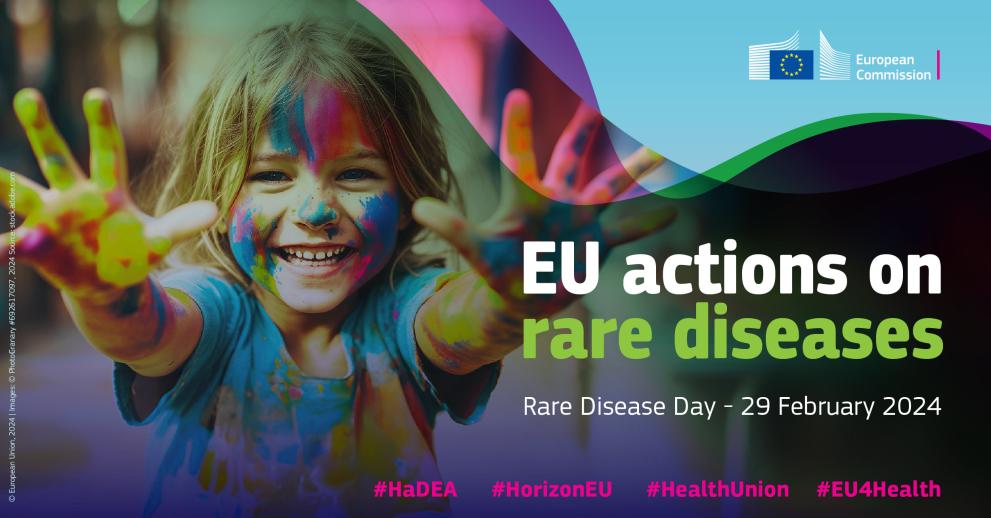
Today we celebrate Rare Diseases Day. In the EU, up to 36 million people live with a rare disease, with around 80% of rare diseases having a genetic origin. Among them, 70% begin to manifest as early as childhood.
To tackle rare diseases, the EU has implemented various initiatives aimed at helping improve the diagnosis, care and treatment of patients and families suffering from rare diseases. One of such initiatives is the establishment of the European Reference Networks (ERNs) for rare and complex diseases. Established in 2017, there are currently 24 ERNs located in 27 EU countries and Norway. Bringing together more than 1619 specialised centres in 382 hospitals, the ERNs are an infrastructure for knowledge creation and sharing, structured collaboration, partnership between experts and people living with a rare disease and virtual expert advice across EU borders.
HaDEA manages the direct grants that provide financial support to the ERNs, as well as the Joint Action JARDIN that supports the integration of ERNs into national healthcare systems. In addition, in October 2023, HaDEA signed the contract “Enhancing the implementation of the Directive on Patients' Rights in Cross-Border Healthcare”. The contract focuses on informing citizens and stakeholders who have decided to seek healthcare abroad about their rights and the provisions of the Directive on Patients' Rights in Cross-Border Healthcare. It also aims to raise awareness about the ERNs, and the existing possibilities for patients affected by rare diseases and conditions to obtain a consultation with an existing ERN.
On Rare Disease Day, HaDEA spoke with Holm Graessner, Managing Director, Centre for Rare Diseases Tübingen, Chair of ERN Coordinators, to learn more about how the Network is supporting patients living with rare diseases by providing them better access to diagnosis and treatment.
1. Can you elaborate on how the ERNs contribute to the treatment of patients with rare diseases?
The ERNs have the ambition to harness EU solidarity to enhance health equality and equity across our countries and expand our health systems' capabilities to diagnose, treat, and manage rare and complex conditions. They are active in four core activity areas, which are: virtual EU cross-border consultation on diagnosis, treatment, and disease management; development, appraisal, and endorsement of clinical practice guidelines and expert opinion-based recommendations, including patient journeys; training and education; establishment of ERN patient registries to allow epidemiological analysis and enable rare disease research.
2. Can you briefly present what has been accomplished so far by the networks in terms of supporting the EU health sector to tackle rare diseases?
Over the last six years, the Networks’ experts have discussed and provided virtual EU cross-border consultations on diagnosis, treatment, and disease management for more than 3,450 cases. This has enabled expertise to traverse borders for the delivery of high-quality care. During this time, the Networks have also developed, appraised, and endorsed more than 400 clinical practice guidelines and expert opinion-based recommendations, and have produced valuable resources in all EU languages for people living with rare and complex conditions.
Structured training and education programmes for young clinicians and healthcare professionals have been set up and all ERNs have established patient registries with the ambition of improving care and fostering research. More than 50,000 patients with rare diseases are currently enrolled in these registries. A repository of patient-reported outcome measures relevant to rare and complex conditions is now publicly available and will facilitate the use of these measures in clinical research and to improve healthcare.
3. How important is the support of EU funding for the activities/work of the ERNs in terms of helping individuals/community? What are the expected future outcomes of their work?
EU funding has strongly contributed to and enabled all of the accomplishments mentioned above and has strengthened the outreach of the networks, through the increase of the participating centres from 900 at the launch of the ERNs in 2017 to more than 1,600 today.
The EU4Health programme contribution, covering the activities of the ERNs, amounts to €103.400.000 for the period 2022-2027, representing approx. €820.000 per year and per network. This funding will support the scaling up of the work carried out so far, further consolidate the Networks and accompany their seamless integration into cross-border and national healthcare systems, which is the next big challenge. It should enable to showcase this model of solidarity and cooperation in highly specialised healthcare as world-leading.
Background information
European Reference Networks (ERNs)
EU4Health, with a budget of €5.3 billion, is the fourth and largest of the EU health programmes. The EU4Health programme goes beyond an ambitious response to the COVID-19 crisis to address the resilience of European healthcare systems. The programme provides funding to national authorities, health organisations and other bodies through grants and public procurement, contributing to a healthier Europe.
HaDEA manages the vast majority of the total EU4Health budget and implements the programme by managing calls for proposals and tenders from 2021 to 2027.
Details
- Publication date
- 29 February 2024
- Author
- European Health and Digital Executive Agency
- Programme Sector
- Health
- Programme
- EU4Health
- Tags
- Public health
